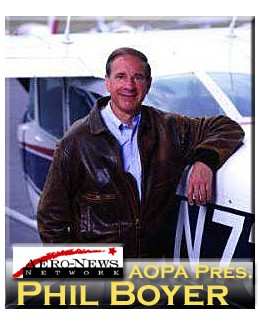Says Concerns Confirmed By Government Report
 A new Government Accountability
Office (GAO) report confirms AOPA's long-standing concerns about
privatization of the air ATC system. Such a move, the report
affirms, would be costly for general aviation (GA).
A new Government Accountability
Office (GAO) report confirms AOPA's long-standing concerns about
privatization of the air ATC system. Such a move, the report
affirms, would be costly for general aviation (GA).
"The GAO's look at other countries' experience with privatizing
air traffic control confirms much of what AOPA has been saying for
years," said AOPA President Phil Boyer. "GA would be hurt and user
fees are not the panacea for financing ATC."
The GAO looked at five commercialized air traffic control
systems in Australia, Canada, Germany, New Zealand, and the United
Kingdom — air navigation service providers (ANSPs) in GAO's
vernacular — and concluded, "The ANSPs have instituted or
increased fees for general aviation operators, and some ANSPs have
increased or plan to increase the costs of service to small or
remote locations."
Nor are user fees necessarily the answer to securely funding an
air traffic control system, said the study.
"Commercialized ANSPs must be prepared to mitigate the effects
of an industry downturn through such measures as establishing a
reserve fund, implementing a revenue-generating alternative to user
fees, or cutting costs," the GAO said as part of the "lessons
learned" in its study.
 For example, NAV CANADA, the
privatized air traffic control system to our north, had banked more
than $66 million in operating reserves prior to September 11. With
the airline industry downturn after the attacks, and again
following the SARS outbreak, the reserve quickly became a $96.9
million deficit. To recover, NAV CANADA had to increase fees more
than once. But that had the inadvertent effect of disrupting the
economically stressed air carriers again, and once again depressing
user fee revenue.
For example, NAV CANADA, the
privatized air traffic control system to our north, had banked more
than $66 million in operating reserves prior to September 11. With
the airline industry downturn after the attacks, and again
following the SARS outbreak, the reserve quickly became a $96.9
million deficit. To recover, NAV CANADA had to increase fees more
than once. But that had the inadvertent effect of disrupting the
economically stressed air carriers again, and once again depressing
user fee revenue.
And while all of the ANSPs claimed greater efficiency over their
government-operated predecessors, GAO couldn't document the claims.
The "predecessor organizations did not necessarily gather or
publicly report comparable data," the GAO report said.
"Consequently, assessments of each ANSP's performance since
commercialization are possible, but comparisons of performance
before and after commercialization are generally not feasible."
"But a simple look at the numbers brings into question the
supposed efficiency benefits from commercialization," said Andy
Cebula, AOPA senior vice president of government and technical
affairs. "U.S. controllers, based on the number of aircraft
operations handled, are roughly three times more efficient than the
average of the five ANSPs studied. The commercialized ANSPs also
average three times as many employees in total (controllers and
managers) per aircraft movement."
GAO did conclude that safety had not been compromised by
commercialization.
 "But they only looked at direct
measures such as loss of separation," said Cebula. "GAO did not
consider indirect safety impacts, such as pilots declining to use
services because of the extraordinary costs charged by some of
these systems."
"But they only looked at direct
measures such as loss of separation," said Cebula. "GAO did not
consider indirect safety impacts, such as pilots declining to use
services because of the extraordinary costs charged by some of
these systems."
The five ATC systems evaluated by the GAO together average about
14.5 million aircraft operations a year. The United States has
nearly 94-million operations a year. Just five of the FAA's 22 air
route traffic control centers (ARTCCs) handle more traffic than do
the five national systems studied combined.
 ANN's Daily Aero-Linx (04.16.24)
ANN's Daily Aero-Linx (04.16.24) Aero-News: Quote of the Day (04.16.24)
Aero-News: Quote of the Day (04.16.24) Airborne 04.10.24: SnF24!, A50 Heritage Reveal, HeliCycle!, Montaer MC-01
Airborne 04.10.24: SnF24!, A50 Heritage Reveal, HeliCycle!, Montaer MC-01 Airborne 04.12.24: SnF24!, G100UL Is Here, Holy Micro, Plane Tags
Airborne 04.12.24: SnF24!, G100UL Is Here, Holy Micro, Plane Tags Airborne-Flight Training 04.17.24: Feds Need Controllers, Spirit Delay, Redbird
Airborne-Flight Training 04.17.24: Feds Need Controllers, Spirit Delay, Redbird




